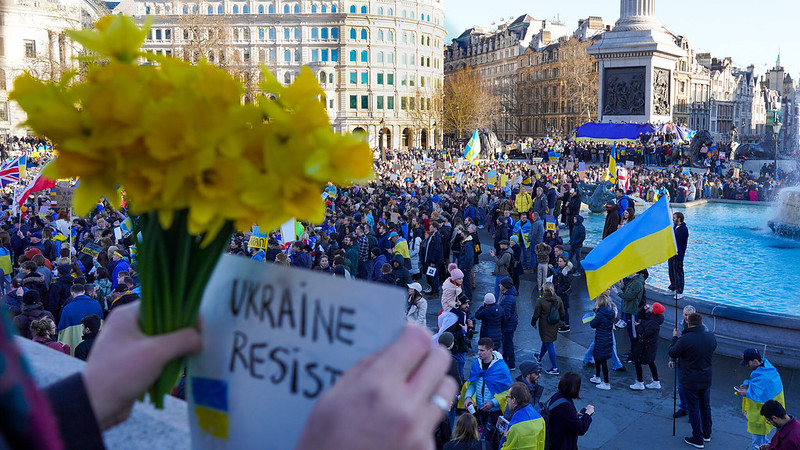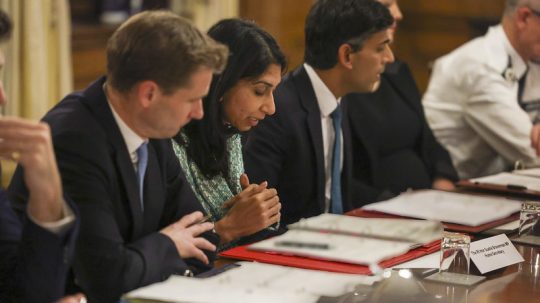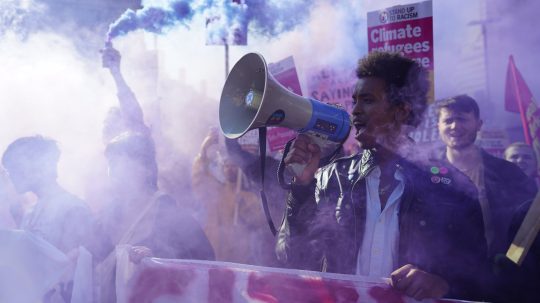On 24 February 2022, the president of Russia, Vladimir Putin ordered a Russian invasion on Ukraine. Since then, life has changed for the people who fled to the UK. A year on from the start of the invasion, we take a look at how life has changed for Ukrainians living in the UK.
Since February 2022, eighteen million Ukrainians have left their homes. Thousands have been forcibly deported to Russia and historic cities now lie in ruins.
Marking a year since the invasion of Ukraine, Foreign Secretary James Cleverly stated:
“This week the war that President Putin expected to last just 3 days, reaches a year in duration. Russian forces have killed thousands of Ukrainians.”
He continued: “I know this House will join me in calling upon Putin to withdraw Russian forces from Ukrainian territory and immediately bring an end to barbaric attacks against civilians.”
Opening peoples front doors
Under the Ukraine Sponsorship Scheme, people and organisations (sponsors) can bring people and their family members from the Ukrainian to the UK under the Homes for Ukraine Scheme. Under the scheme, people are able to stay in the UK for up to three years, as well as work and access public services and claim benefits.
Since the scheme was established, people seeking refuge from elsewhere in the world have not been offered the same support. In the last year, there have been several investigations into the treatment and processing of people arriving in the UK on small boats. In 2022, former Home Secretary, Priti Patel signed the Rwandan Migration Partnership which would seek to move people seeking asylum to Rwanda for processing.
Life in the UK, a year on
Olga, 32- years old spoke to us about her experience of moving to Leicester, 10- months ago, after fleeing her family home in Ukraine.
Olga stated: “I have found the community to be welcoming here in Leicester. The area that we are in is good and we have been able to continue daily life with some normality. There is a sense of helping people here which is good and everyone is welcome in the church, it’s a safe space.”
While Olga has found a sense of community in Leicester, she told us that she knows this has not been the case for everyone who fled their homes in the last year.
Olga stated: “I know that that has not been the case for everybody. Some others (coming from Ukraine) have had different experiences with living in other family homes or not having good experiences with things here. It’s very hard, what has happened has been very hard. Everybody’s experience has been different but we all have had to adjust and start over.”
Forced to start over
According to the ONS survey data, of those refugees who have found jobs in the UK, 65% were not working in the same sector as they had in Ukraine. Notably many had moved from education and finance into the hospitality, food production, agricultural and farming sectors.
A total of 56% of Ukrainian respondents said their insufficient English language skills had been barriers to finding employment in the UK, while 33% said employers had failed to recognise their Ukrainian qualifications.
“I also know that not everybody who has had to leave their homes has felt they have been as welcomed as us [coming from Ukraine.]” Olga stated:
There have been reports of some refugees being put in uncomfortable situations when they have come into contact with individuals who are supporters of Putins regime. Anastasia*, a cook from the Zaporizhzhia region, told The Conversation she had been provided with a Russian interpreter when visiting a hospital, who turned out to be a supporter of Putin.
Anastasia told The Conversation: “I was very badly affected … she started asking me about us, about our situation, about our war and said that the Americans are to blame that we have a war. She said that the Americans are to blame – not Russia.”
London to host the Ukraine Recovery Conference 2023
The next Ukraine Recovery Conference will take place in London on 21 to 22 June 2023. The event is a continuation of the series of annual conferences dedicated to Ukraine’s transformation. The first took place in London in 2017 as the Ukraine Reform Conference.





